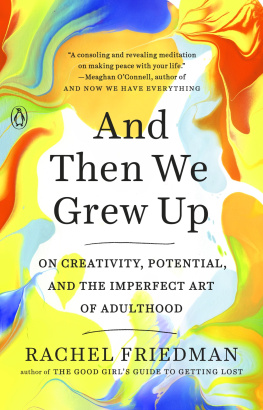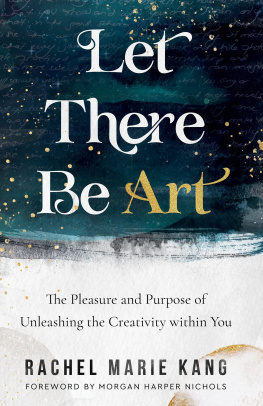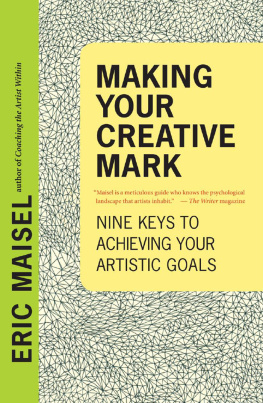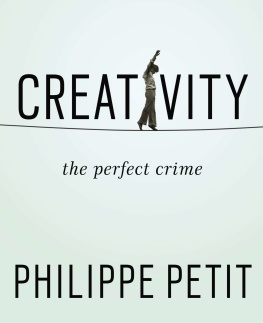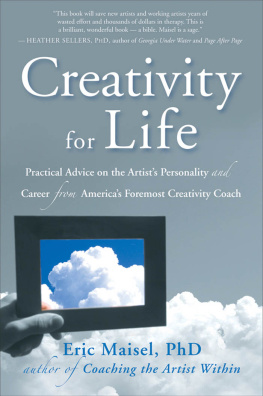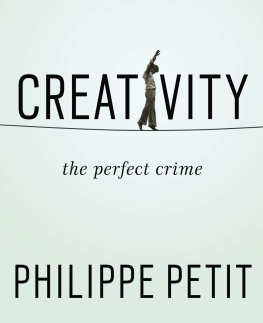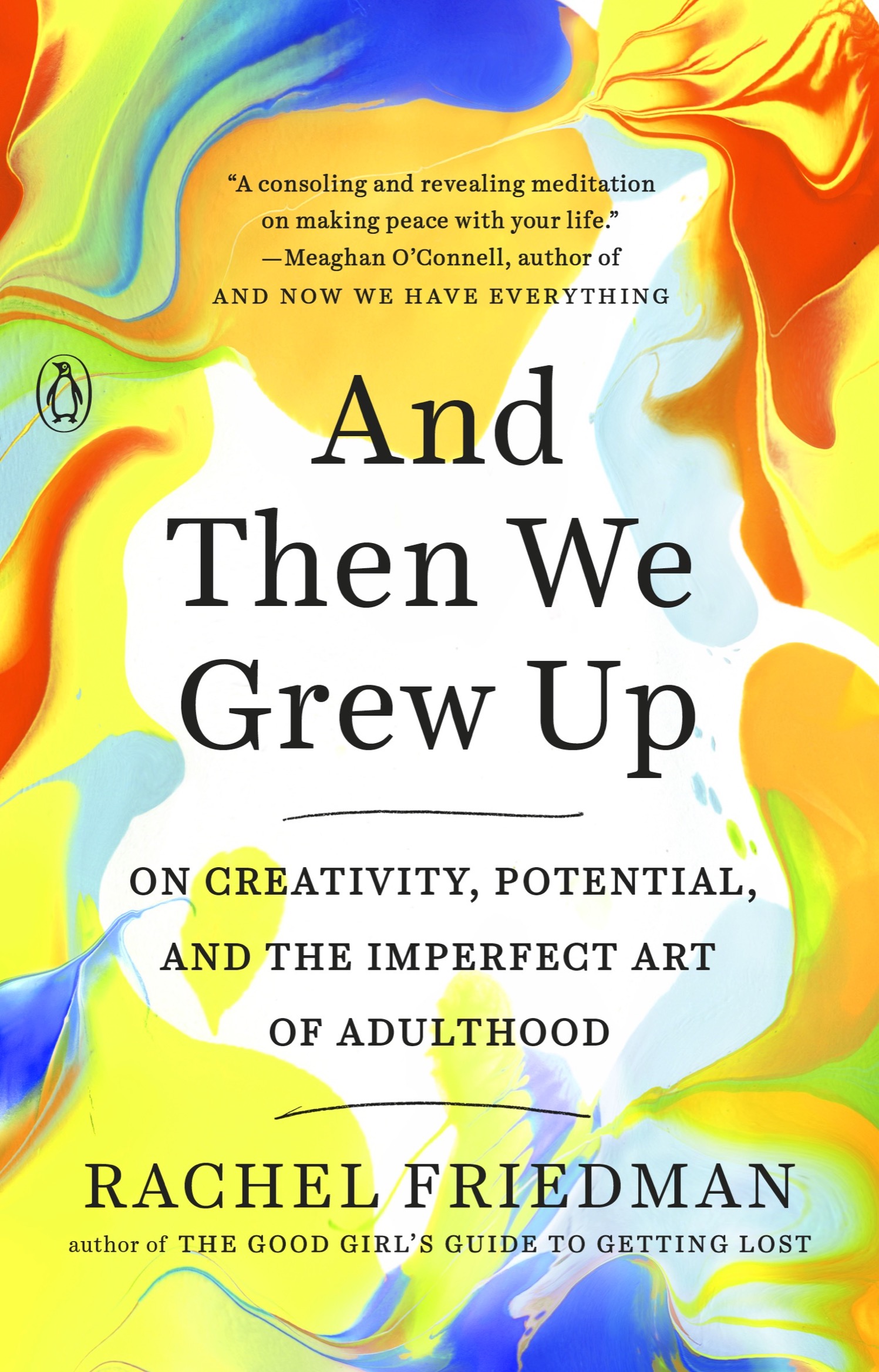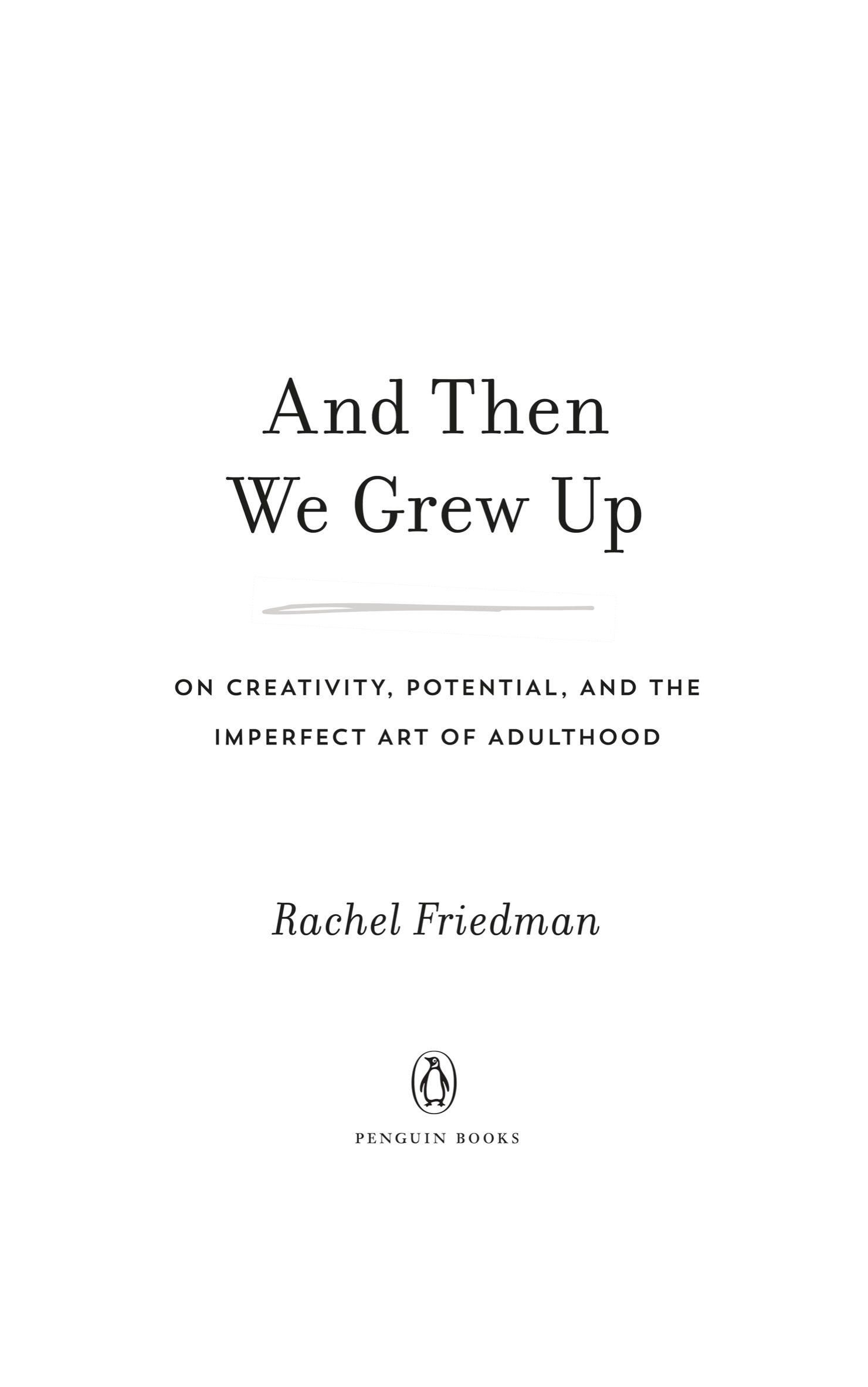Praise for And Then We Grew Up
In this funny, insightful book, Rachel Friedman asks hard questions and actually comes up with some answers. Its a must read for everyone who struggles to find a path, fulfill their potential, make a living, and make a life.
Emily Gould, author of Friendship
And Then We Grew Up is real as hell and made me feel so seen. Friedman captures so perfectly the endless quest to be a functional happy person in the world who is also, somehow, an art monster. Searching, honest, and generous, this book is a consoling and revealing meditation on making peace with your life.
Meaghan OConnell, author of And Now We Have Everything
Advice about doing what you love often clashes with reality in midlife. In her thoughtful, generous booka kind of The Big Chill reckoning for mid-life creativesRachel Friedman explores how she and her talented childhood friends reached various states of disillusionment and fulfillment. And Then We Grew Up is the perfect gift for anyone trying to reconcile a desire to write, play music, or make art with more pedestrian desires, like having a family, food on the table, or peace of mind.
Ada Calhoun, author of Wedding Toasts Ill Never Give
Did you grow up pointed in an artistic direction? Did you not, but wonder about those who did? Do you have kids of your own with art in their hearts? If yes on any of those, And Then We Grew Up will be of interest on a dozen levels. With candor and humor and perfect intonation, Rachel Friedman gets at one of the biggest questions of all: What happens to us as we get older?
Chris Colin, author of What to Talk About and What Really Happened to the Class of 93
An insightful, informative, and unexpectedly heartfelt look at all of the ways in which art touches our lives. Friedman reminds us that even if we hang up our dance shoes, neglect our paint set, or box up our musical instruments, creativity never really leaves us.
Geraldine DeRuiter, author of All Over the Place: Adventures in Travel, True Love, and Petty Theft
In And Then We Grew Up, Rachel Friedman is a wise and funny guide through a tangle of hard questions about art, work, and lifeabout what it means to make it, about the many shades of success and failure, and about the search for fulfillment through creativity. Brave enough to examine her own biases, assumptions, and hangups, she provides a way forward for the rest of us who have wrestled with these questions, too. Essential reading for anyone who wonders about the role of creativity and art in their life.
Eva Holland, author of Nerve: Adventures in the Science of Fear
PENGUIN BOOKS
AND THEN WE GREW UP
Rachel Friedman is the author of And Then We Grew Up and The Good Girls Guide to Getting Lost. Her work has appeared in The Best Womens Travel Writing, The McSweeneys Book of Politics and Musicals, The New York Times, Creative Nonfiction, and The Chronicle of Higher Education, among others. She lives in Brooklyn with her son.
A LSO BY R ACHEL F RIEDMAN
The Good Girls Guide to Getting Lost
PENGUIN BOOKS
An imprint of Penguin Random House LLC
penguinrandomhouse.com
Copyright 2019 by Rachel Friedman
Penguin supports copyright. Copyright fuels creativity, encourages diverse voices, promotes free speech, and creates a vibrant culture. Thank you for buying an authorized edition of this book and for complying with copyright laws by not reproducing, scanning, or distributing any part of it in any form without permission. You are supporting writers and allowing Penguin to continue to publish books for every reader.
LIBRARY OF CONGRESS CATALOGING-I N-PUBLICATION DATA
Names: Friedman, Rachel, 1981 author.
Title: And then we grew up : on creativity, potential, and the imperfect art of adulthood / Rachel Friedman.
Description: New York : Penguin Books, [2019] | Includes bibliographical references.
Identifiers: LCCN 2019019646 (print) | LCCN 2019020365 (ebook) | ISBN 9780525503859 (ebook) | ISBN 9780143132127 (paperback)
Subjects: LCSH: Friedman, Rachel, 1981 | Women authorsUnited StatesBiography. | Adulthood. | Conduct of life. | Self-actualization (Psychology)
Classification: LCC CT275.F714 (ebook) | LCC CT275.F714 A3 2020 (print) | DDC 305.24dc23
LC record available at https://lccn.loc.gov/2019019646
Penguin is committed to publishing works of quality and integrity. In that spirit, we are proud to offer this book to our readers; however, the story, the experiences, and the words are the authors alone.
Some names and identifying characteristics have been changed to protect the privacy of the individuals involved.
btb_ppg_c0_r1
For Eben
AUTHORS NOTE

I have changed most names in this book. Conversations and texts have been edited for length and clarity, and some time frames have been compressed. However, all melodramatic, existential despair of mine described in these pages is entirely unaltered.
CONTENTS
1

Potential
This all started with taxes. I had taken the E train out to the last stop in Queens and descended a few crumbling steps into my accountants drab basement office. Every year I seemed to interrupt him in the middle of lunch, no matter the hour of our appointment, and this visit was no exception. His right hand deftly directed chopsticks full of sesame chicken into his mouth while his left tapped numbers into a computer. In a different life, the former musician part of my brain thought, he might have made a decent pianist.
I had made barely enough money that year to cover rent and groceries, but I reasoned that barely was pretty good in Manhattan, an increasingly unaffordable borough for artists who once thrived there. I had taken on any and every freelance writing assignment, from churning out SEO clickbait for travel websites to reporting on heat-resistant makeup for a glossy womens food mag. Id become a veritable pitching machine, developing into overdrive the Minority Report part of ones brain capable of scanning every new person, place, and piece of news for a potential story angle.
Nevertheless, when my accountant added up the numbers, I somehow owed way more money than was in my savings account, which was more of an aspirational idea than a place actual currency resided.
Four thousand dollars, he said through a mouthful of Chinese food.
Four thousand? I gasped.
Four thousand, he said, swallowing.
FOUR. THOUSAND. DOLLARS. The impossible number kept echoing in my head as I wandered back toward the subway. My West Fourth Street stop let me off by IFC, my favorite cinema, and I heard my film professor fathers voice telling me that the best escape from my anxiety was right there in front of me. I bought a ticket for a movie whose poster gave off a Bonnie and Clyde vibe and settled into the nearly empty theater.

